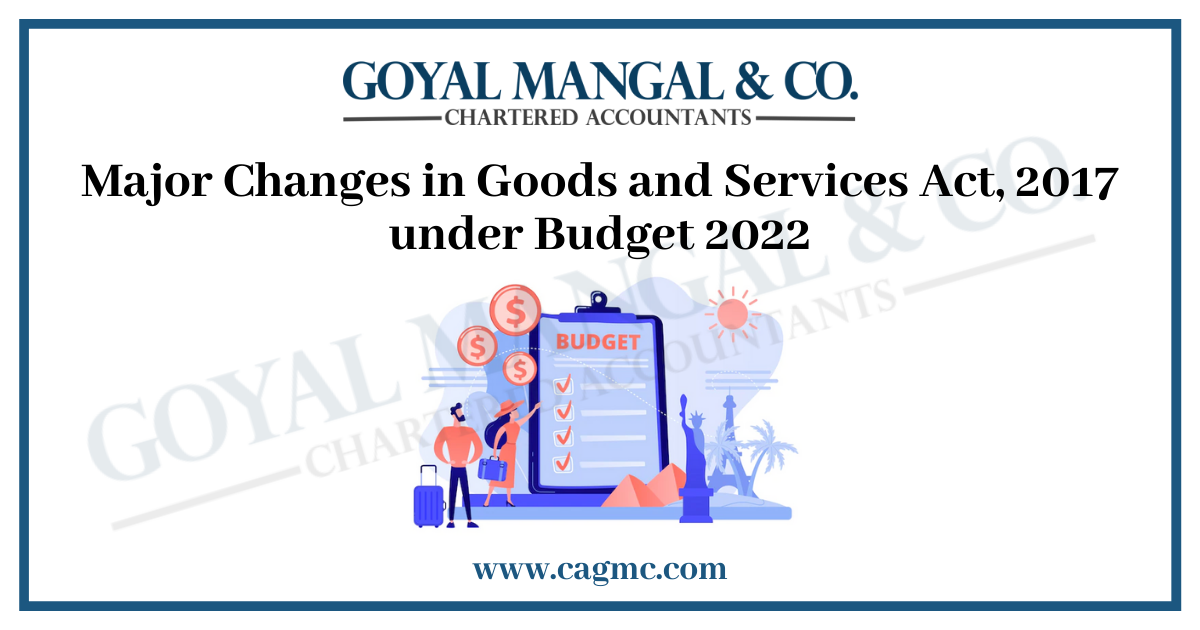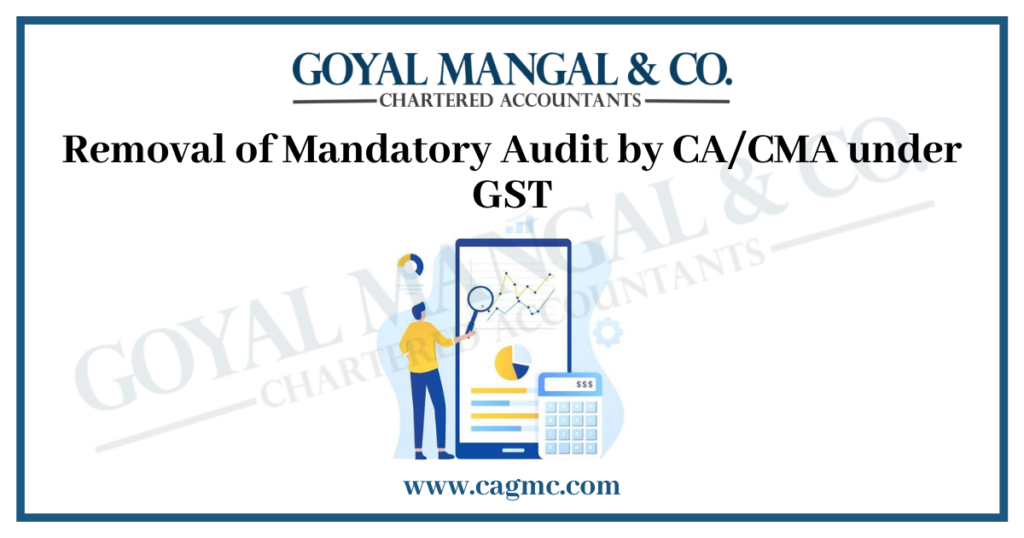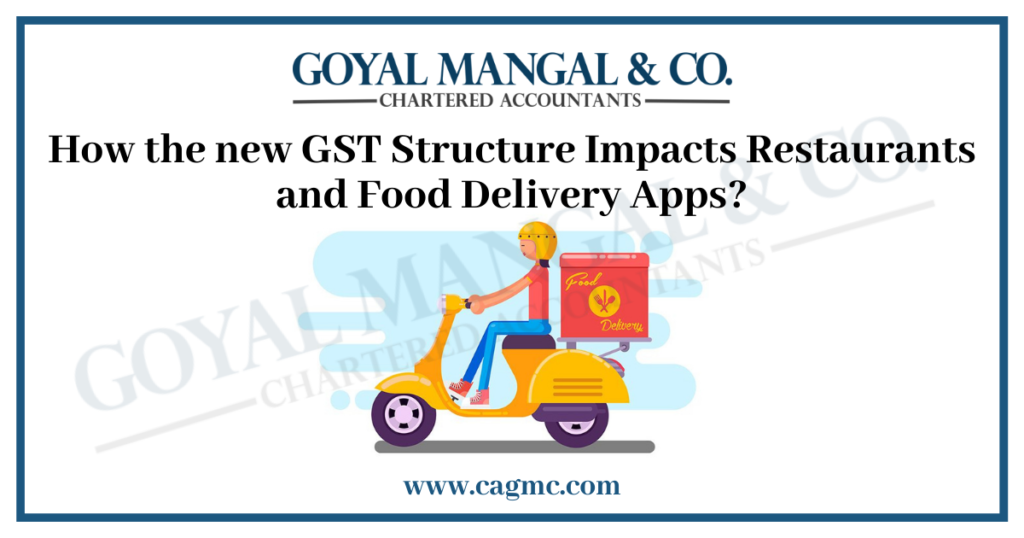
Smt. Nirmala Seetharaman, the Finance Minister, presented the second digital union budget 2022-2023 on February 1, 2022. As a result, the proposed GST adjustments were covered by provisions 99 to 123. The Union Budget for 2022 was announced by the Finance Minister in the wake of the highest-ever tax receipts of 1.38 lakh crores from GST revenues. It is crucial to note that the proposed adjustments will take effect on the date when the Central Board of Indirect Taxes and Customs (CBIC) notifies the public. Several suggested adjustments, on the other hand, will take effect on the day that the Finance Bill, 2022, is enacted. Furthermore, we shall discuss The Major Changes in GST in Budget 2022 in this blog.
What is Goods and Services Tax?
The GST (Goods and Services Tax) is an indirect tax (sometimes known as a consumption tax) imposed on the supply of goods and services in India. The Goods and Service Tax Act was passed by Parliament on March 29, 2017 and into effect on July 1, 2017. It is a destination-based, multistage, comprehensive tax as it includes practically all indirect taxes, with the exception of a few state levies. The GST, as a multi-staged tax, is imposed at each stage of the production process, but it is intended to be refunded to all parties involved in the various stages of production except the final consumer, and as a destination-based tax, it is collected from the point of consumption rather than the point of origin, as previous taxes were.
ITC is now Subject to even more Restrictions
Under section 16(2), an additional condition for claiming ITC by a buyer has been imposed, stating that ITC with respect to an invoice can be claimed only if such ITC has not been restricted in the details communicated to the buyer in the form of an auto-generated statement (i.e. GSTR-2B) u/s 38 of the CGST Act.
Also, section 38 has been amended to require that the auto-generated ITC statement (i.e. GSTR-2B) must now include the two key components listed below.
- Information on ITC that may be claimed;
- Information on ITC that cannot be claimed in connection with invoices submitted under section 37(1) –
- By any registered person within the time limits set forth in the registration agreement.
- Any registered person within the time limits set forth in the registration agreement.
- By any registered person who has failed to pay tax and has been in default for a period of time as may be prescribed; or
- By any registered person for whom the output tax payable in accordance with the statement of outward supplies given by him under the said paragraph during such period as may be prescribed exceeds the output tax paid by him during such period by such limit as may be prescribed.
- Any registered person who, over such period as may be prescribed, has claimed an input tax credit in an amount that exceeds the credit that he is entitled to under subsection (a), up to the prescribed limit.
- By any registered person who has failed to discharge his tax debt in accordance with the provisions of section 49, sub-section (12), subject to any terms and limits imposed.
- Or by any other group of people that may be specified.
The Time Restriction for ITC Claiming
It is proposed that the time limit for claiming input tax credit be extended. According to this, a registered person can claim an input tax credit on an invoice/debit note for the previous financial year by the 30th November of the following year. However, please note that, under existing laws, a registered person may claim an input tax credit for an invoice/debit note issued during the previous fiscal year no later than September 30th of the following year.
Extension of Deadline for GSTR-5 Filing
- By the 13th of the next month, a non-resident taxable person must make a monthly return in GSTR-5.
- Allow for an extension of time to correct errors in Form GSTR-3B until the 30th of November of the next fiscal year. Subsequently, Sections 47, 48, and 169 of the CGST Act have been amended.
- Allow the individual filing a return under proviso to Subsection (1) to choose between paying the self-assessed tax or the required amount.
- The filing of GSTR-1 has been made a requirement for the filing of GSTR-3B for the tax period in question.
Changes Under The provisions for cancellation of registration
- Section 29(2) (b) is being revised to provide for the cancellation of a composite dealer’s registration if he fails to file a return for a financial year more than three months after the required date.
Previously, if a dealer failed to file a return for three consecutive tax months, the registration might be revoked. This change is being made because composite dealers were previously required to file quarterly returns, but are now required to file annual returns. As a result, three tax periods would equate to three years, which was not the goal of legislators. As a result, this change was required.
Changes related to outward supplies
- It outlined the requirements for supplying outward supply details in GSTR-1 and communicating such details to recipients via GSTR-2B.
- It allows for the filing of outward supplies in a logical order, without the need to skip tax periods.
- For rectification of inaccuracies affecting outward supplies as reported in GSTR-1, an extended time limit of till the 30th November of the next financial year was granted.
- Due to the suspension of the GSTR-2 return, the two-way communication process for filing the return was cancelled.
Provisions for GST Return under section 39
- The time limit for filing GSTR-5 by non-resident taxable persons will be reduced to the 13th of the following month instead of the 20th of the following month under Section 39(5).
- Section 39(7) is being amended to give taxpayers who file a GST return under the proviso to sub-section (1) the option of paying taxes either on a self-assessment basis (as is now done) or in a different manner that will be prescribed by the government later.
- Section 39(9) is being changed to provide for rectification of errors in returns filed under section 39 until the 30th November of the next fiscal year.
Tax refund under Section 54
- The amendment recommends that any balance in the “Electronic Cash Ledger” be refunded in a specific prescribed form and manner.
- Furthermore, it is planned to set a two-year time limit for claiming a refund under section 55 of the CGST Act, i.e., a refund for the specified agency, on inward supply of both goods and services.
Conclusion
Further, to conclude we can say that through these amendments, taxpayers have been given assistance in deploying their cash, but it is still required that they adhere to all compliance requirements.


